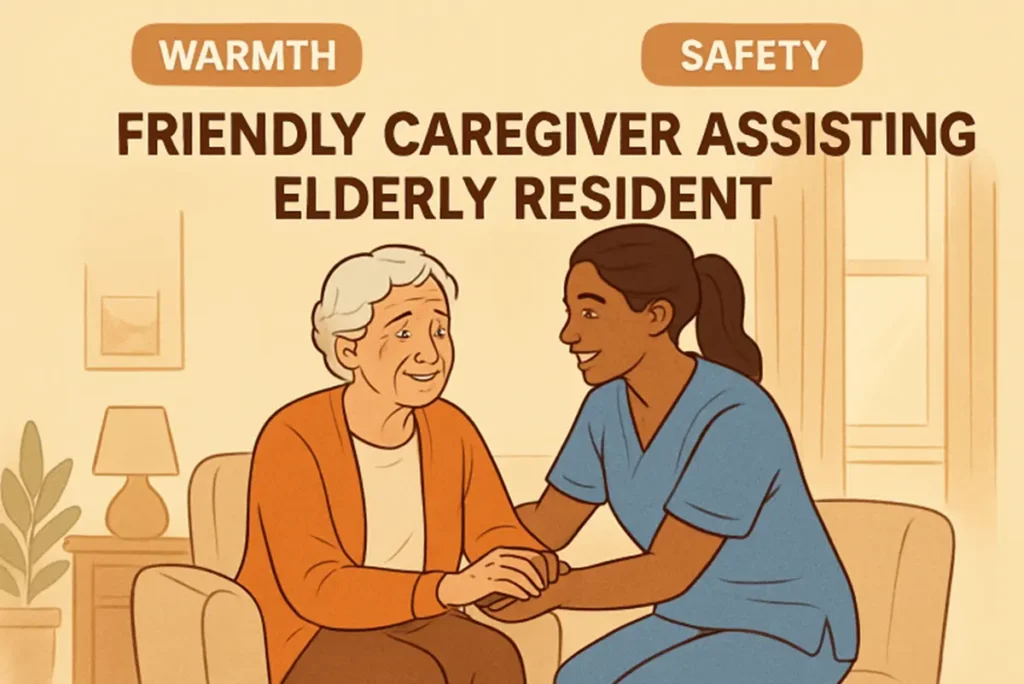Understanding Memory Care in Senior Living
Memory care represents a specialized approach to long-term care designed specifically for seniors living with Alzheimer’s disease, dementia, or other cognitive challenges. These dedicated communities focus on addressing the unique needs of memory loss—including emotional support, safety, and daily engagement—creating the best possible environment for residents to thrive.
Unlike standard senior living options, such as assisted living or independent living, memory care provides round-the-clock supervision and programs rooted in dementia care best practices. Families evaluating options like an assisted living community in Nassau County, NY benefit from environments where security, specialized staff, and stimulating activities are at the forefront of resident care.
In memory care, residents are supported by caregivers trained specifically to manage behavioral cues and cognitive decline. The focus is on providing a lifestyle that promotes stability and dignity through positive routines and individualized care. Memory care communities are meticulously crafted to minimize confusion and stress—factors that can greatly exacerbate cognitive symptoms.
Furthermore, the goal is to support each resident’s emotional and physical health. These communities help residents maintain a sense of purpose and belonging through targeted therapeutic activities and structured schedules, even as their cognitive needs change.
Key Features of Memory Care Facilities
- Secure Environments:Memory care units are typically equipped with enhanced security systems, such as monitored entrances and alarmed exit doors, to protect residents at risk of wandering—a frequent issue in dementia care.
- Specialized Staff Training:Caregivers and team members are continuously educated in memory care strategies, including redirection, validation therapy, and crisis management techniques, to better respond to the unpredictable nature of cognitive decline.
- Structured Routines:Predictable daily schedules help minimize anxiety and confusion by providing residents with cues they can rely on, supporting their comfort and orientation.
- Therapeutic Activities:Communities develop engaging programs, from music and art therapy to physical fitness and reminiscence groups, specifically tailored to slow cognitive decline and maintain joyful living.
Benefits of Memory Care
Memory care environments have been shown to offer significant benefits to those living with dementia or related conditions. Due to the constant oversight and specialized support provided, residents are less likely to experience preventable injuries or hospitalizations. The structured environment and consistent care practices nurture emotional well-being and reduce distress or agitation.
Therapeutic programming boosts cognitive function and can help preserve skills and foster social connections. According to the Alzheimer’s Association, such interventions can lead to better outcomes, enhancing residents’ quality of life and offering families peace of mind.
When to Consider Memory Care
Recognizing when it’s time for memory care can be challenging. Increased forgetfulness, difficulty performing daily activities, frequent mood swings, or concerns about personal safety are warning signs. Families might also notice wandering, inappropriate behaviors, or unexplained injuries—all indicators that specialized care may now be necessary. Early intervention often leads to a smoother transition and supports preserving a loved one’s independence for as long as possible.
Choosing the Right Memory Care Community
Choosing a memory care facility should be made thoughtfully, as it plays a central role in your loved one’s wellness. Take the following steps when researching options:
- Compile a list of communities with established memory care programs.
- Tour each facility to experience the atmosphere and observe caregiver-resident interactions.
- Ask detailed questions about staff training in dementia care and the community’s resident-to-staff ratios.
- Evaluate the extent and quality of therapeutic activities that support cognitive and emotional health.
- Request a clear breakdown of costs, including which services are included and what may incur additional charges.
For comprehensive advice on selecting senior care, visit this helpful resource from AARP.
Financial Considerations
Memory care costs vary widely based on location, amenities, and level of specialized care. In the United States, these services are rarely fully covered by Medicare, though certain Medicaid programs, long-term care insurance, or veterans’ benefits may offset some expenses. It is important to assess all available resources and speak with a financial advisor or elder law specialist early in the process.
Many communities offer assistance in navigating financial options, payment plans, or aid-specific applications, so ask each prospective facility for guidance to prevent unwelcome surprises later on.
Supporting Loved Ones in Memory Care
Even after moving into a memory care community, family involvement remains pivotal for the well-being of your loved one. Regular visits, participation in care team meetings, and close communication with staff foster community and reinforce support. Personalized touches—like photo albums, meaningful music, or familiar scents—can provide comfort and continuity to residents navigating memory loss.
Establishing a consistent routine for visits and communication while remaining involved in care planning and advocacy can further enhance your loved one’s experience and sense of security as they adjust to their new environment.
Final Thoughts
For families facing cognitive decline, understanding the purpose and value of memory care is critical for making compassionate, informed decisions. Specialized memory care facilities deliver the expertise, security, and person-centered programs needed for individuals to live with dignity and comfort. Through careful research, financial preparation, and ongoing family involvement, loved ones can flourish in a supportive environment purpose-built to meet their evolving needs.
Also Read–How to Find Balance in a Digitally Connected World
